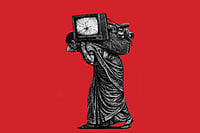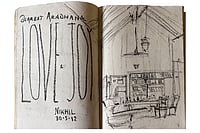I am rewriting the story. The nth time. A story about me and the horse with a broken foot, a story about the lizard on my walls, a story about a professor in a film who was writing a curriculum of darkness, a story about me and arrivals and departures. This is my apocalypse story. In the beginning, there was a horse with a broken foot under a flyover. At night, the cold white light installed as part of the city’s scheme to light up the streets made the horse more pronounced. In that concrete dystopian landscape, the horse stood motionless.
This was in Lockdown 1.0, April 2020. The beginning of what everyone called the “end of the world”. But endings are an illusion. The horse didn’t turn to look at me looking at it. The horse could have been abandoned. The sharper edges of his body—shoulders, jaw, knees—poked through the blackness of the night. It had a broken foot. I could see this from the car. A press card allows for many such encounters. There was nobody else around. The Prime Minister of the country had asked everyone to stay at home. He, I think, forgot the homeless. The horse also had no home.
It stood there motionless under a signpost that marked the neighbourhoods in that part of the city. Abul Fazal Enclave, Shaheen Bagh, etc. In the middle of the street near the metro station, the new-age structural marvel with the rail tracks looped overhead. The horse reminded me of other horses in stories. Chestnut-grey of the Russian fairy tales I had grown up reading, and the white stallion of the blue god Kalki, the tenth and the final avatar of Lord Vishnu, that would ride out as he sets out to “establish righteousness upon the earth”.
This horse was brown. I left the horse gazing into oblivion. I thought about the horse often.
***
In a glass cage, Kalki stood looking outside. Outside consisted of a lot of people weeping and a lot of people burning. Pyres, mourners and frontline staff in their PPE kits. We walked on earth as if we were walking on the moon in those space suits. We heard each other but never saw each other. That’s how the shift started. With a pandemic. And a story about a blue god.
When I was a little girl, my mother would tell us stories about a time that would come when it would rain continuously for nine days and nights followed by an intense famine. Then, epidemics, pandemics. People will die, she said. There would be hunger wars, water wars, etc. I remember the mention of floods, drought and diseases and red suns. The ones who would remain, the leftovers, would then see the apocalyptic horse rider. I imagined this slayer god often. My mother had said the apocalypse was far into the future. Was this that future? We had arrived too soon.
ALSO READ: Song Sung Blue: The End As A New Beginning
Two bodies of those that qualified as suspect Covid victims were being burnt in the crematorium. Among them was the body of a 6-month-old girl. Outside, the blue god waited in a glass case at Nigambodh Ghat. It was April 16, 2020.
***
“That night the professor took a decision to keep track of his hallucinations...”
The apocalyptic horse rider
~Such a Morning by Amar Kanwar, 2017
I also thought about an old professor who went to live in an abandoned train coach in a forest. A parable as a film. The film-maker insisted it was fictional. The dean had offered an explanation for the professor’s departure. He said he was a misfit. And “No one agreed. But no one disagreed either”. There was a hint of a ruined love but the mathematics professor offered no counter-narrative to the speculations. The forest could be anywhere. It had no location, no geography, no date. This was a prophecy.
The professor was developing a curriculum for 49 base studies of darkness. He called it the Almanac of Dark. There were four languages to study relationships. Three had a script. One didn’t. There were no dialogues either. Only abstract text appeared on the screen every now and then. Many speculated on the spiritual or political reasons for such a severe move by the old professor. Some felt the old man was losing his eyesight, and the decision to go into the zone of darkness was to acclimatise himself to the darkness that would arrive.
In another frame, a woman sat through the night and the day with a rifle next to her in an abandoned house while men tore down the building. Were they in love? “They could be. They are us.” Why does the man prepare for darkness? To just think or to even see—you need to prepare first to be able to think, to be able see and to then perhaps begin to comprehend. What is this darkness?
It is better that you [and all of us] decide what you/we think is your darkness.
ALSO READ: The Four Horsemen Of Apocalypse
“What is your darkness?” he asked. I have been looking for it. The 50th kind of darkness.
Loneliness? Could that be it?
***
I shared a rented apartment with two lizards. One had an eye that was damaged. The other looked alright. Perhaps there were other lizards but they were hiding. Or maybe they walked on the black and white mosaic floor in the night. I hardly ever stepped out of my room. I left the rest of the rooms to the reptiles. They weren’t afraid of me. They would only run a short distance when they saw me. I had begun to like them a little. Perhaps it was some kind of solace that there were others besides me breathing in the house.
ALSO READ: Meowdi: A Short Story by Perumal Murugan
I spent a lot of time watching the lizards on the wall. They were always so still. I wondered who took away their bodies when they died. Or if lizards talk. Or if they are lonely. I watched a lot of films then. Serial killers and zombie films. An apocalypse state of mind. There was so much death around the two lizards on the wall, it was almost a beautiful thing.
I started writing letters to people I hadn’t met. Just in case. “You and I were only meant to exist in this world as two people who could have known each other but didn’t. You and I were not meant to sit in a cafe at the same table. You and I were meant to read newspapers in different cities and continents and not mourn the same deaths.
You and I were meant to be one of those million people that exist in the same universe but whose lives are like parallel lines. You can’t tell if parallel lines run in the same direction or run opposite to each other. Mathematics doesn’t explain it.
ALSO READ: Gods, Bots And The New World Order
You see, that’s the only way it all makes sense. You and I weren’t meant to make sense. But maybe you and I were meant to remember that Diego Maradona on the day he died had talked about the ‘hand of god’ once. And maybe that ‘hand of god’ meant different things to you and me.” The letter remains unsent.
***
“Who walks alone in the streets at night? The sad, the mad, the bad. The lost, the lonely. The sleepless, the homeless. All the city’s internal exiles. The night has always been the time for daylight’s dispossessed—the dissident, the different,” writes Matthew Beaumont in his book called Nightwalking, which is an exploration of London in the night.

Photograph: Shutter Stock
I qualified as an internal exile, also, as someone who suffered from insomnia. My nightly excursions during the lockdown began with the epigraph of a book I found on my shelf, The Book of Interfering Bodies by Daniel Borzutzky. On the evening of April 4, the first in the series of these nocturnal wanderings in the National Capital during the lockdown, I left the book outside the door of a person along with a pack of cigarettes. I assumed the person must have run out of cigarettes. I didn’t necessarily think he had run out of poems.
The epigraph from the 9/11 Commission Report said something about re-imagining the poet as bureaucrat, barbaric writer, and terrorist. He talked about the bureaucratisation and routineisation of imagination. It was an apocalyptic book that invoked the role of a writer in society. It isn’t an easy book but it was a perfect one for someone who had once told me about how poetry could be evidence. In the final chapter of The Book of Interfering Bodies, all the other chapters with apocalyptic themes come together to form a tower. This book led to another, as all books do. In The Library of Babel, Jorge Luis Borges refigures the universe as an infinite irrational library. In this library, there are 410-page volumes with every possible permutation of twenty-two letters, spaces, commas, and periods. Endless pages of gibberish.
ALSO READ: The Good Earth: Resilient And Resourceful
“I believe I have mentioned suicides, more and more frequent with the years. Perhaps my old age and fearfulness deceive me, but I suspect that the human species—the unique species—is about to be extinguished, but the Library will endure; illuminated, solitary, infinite, perfectly motionless, equipped with precious volumes, useless, incorruptible, secret,” Borges writes in The Library of Babel.
A book as a gift should then endure, I thought. I had no prior experience in apocalyptic protocols. Although, some would say apocalypse is every moment, I’m all for a grand party. Light shows, etc. On many nights afterwards, I dropped cakes, bread, cigarettes for people. It was an exploration into the future of trust, of love itself. It was a pandemic of loneliness, of distrust, of abandonment. A journalist is free to move around, to chronicle the apocalypse, file dispatches.

Photograph by Chinki Sinha
Billboards still advertised aspirations of beauty, of upscale apartments and of travel. Except, nobody was around to read these promises. Consumerism is like a virus. It mutates. It is stubborn. It kills, too. I thought I could let my eyebrows grow. I went back to pulling out my hair, one strand at a time. The impulse disorder called trichotillomania returned. I had too much unstructured time. I googled experts. They said the behaviour picks up in free time. I couldn’t sit idle. The pandemic manufactured trauma at a high speed and slowed down time. There was nobody looking. I was an anonymous tramper in the city. But I was also trying to not go bald. It is a circular city. You can go around and end up in the same place. Outer Ring Road. Inner Ring Road. I went around in circles. Is the apocalypse a song of concentric pathways?
What is a city but a life sentence for many. Expansive. Everything and everyone were on my screen. Tap, tap and a face appeared. Or faces showed up. The screen was everything. Except it wasn’t. Where was love? It was a season of separations. A season of disappointments. A season of death. I returned to the sites of protest. In Northeast Delhi where communal riots had happened in February 2020, I saw a sooty wall. Someone had scribbled Bella Ciao on it. The song of resistance of Mondina women in Italy, which literally means ‘goodbye beautiful’, was almost an anthem during the anti-CAA-NRC protests. Like the virus, the song had also come from a faraway place.
“And this flower of a partisan
Is the flower of freedom.”
In another part of the city, a billboard remained unchanged. It had once instructed the people: “Remember what is important not because it is present. Because it is absent.”
***
I traveled to all “elsewhere” places. Out of a strange compulsion to see the world. From all hotel rooms, I wrote notes to the world. I wrote about how the ravines looked like in Chambal where I had gone to listen to the songs they wrote about the dacoit queen Phoolan Devi, who had killed 22 upper caste men here to avenge her honour. She is long dead. But the river still cuts through the land like a hot knife. Clean, sharp cuts. The bleakness of the landscape had finally hit me at dusk when I stood on the embankment. The river in the distance looked like it could swallow whatever remained of this damned place. It seemed like the river had devoured the land and vomited the hillocks that dot the landscape.
It was all irregular. Like an abnormal heartbeat revealed in an electrocardiograph. I traveled here to see bleakness, to prepare for the apocalypse like the old professor in that parable.
“You know how it looks like—a body that has erupted in boils. A canvas of unrelenting pain. And yet it is breathtakingly beautiful. To witness bleakness is liberating. You give up all hope of consistency,” I wrote in my notebook that night from a nondescript hotel room with a television stuck on the wall and a red velvet blanket with roses printed on them. So much for my bourgeois and boutique despair.
***
In April 2021, a body wrapped in plastic and sealed with tape lay on a bed in a hospital room in Delhi. I have a photo on my phone. My friend sat in a chair and watched the motionless body of the woman who was admitted the previous day. At some point, her oxygen level must have dipped. She sent me that photo from the hospital. It must have been a prelude to the apocalypse. People had queued up for oxygen. Someone said we must breathe less.

Poetry of Resistance Water colour and hair on paper. By Kumari Ranjeeta
In those days, bodies were dumped in the rivers. The mounds on the banks of the Ganges, captured by drone, looked like boils on a face. That’s how the world was going to end. With nameless bodies burning, rotting, bloating. The rest of us had become spectators. I still think about the body wrapped in plastic often. Perhaps the apocalypse was the death of all hope. Perhaps it is a place of despair, a screen on which you watch the tickers saying hospitals had run out of oxygen, people gasping for breath, fumes that looked like giant ravens spreading their wings and devouring the sun. Bodies in the sun. Bodies in morgues. Bodies everywhere. We never made it to the Armageddon.
ALSO READ: Covid Nightmare: Time Of The Living Dead
“What is your darkness?” That old question returned.
***
Lying on a hotel bed this December, I watched the fog envelope a bridge in Patna, my city. I was talking to a friend about a demolished house and a woman living there alone and reading poems. There were no stars in the sky. Six street lights were trying hard to illuminate a building with nobody inside. All the windows in the building looked sad. A tree merged with the night. I wished I had the mind of the sky.
In this city of perpetual wait, billboards had surrendered to the wind and the rain and the sun. All these torn billboards outside my window looked like those unsent letters. If apocalypse could be a frame, it would be these billboards with nothing to sell. An old house stood there quietly protesting against the city’s new-found thing for demolition drives.
I was out in the apocalyptic world looking for love stories. The paper stars are aglow in my house. Seven stars in total. Does that make a constellation? The silver star I named after the abandoned horse with the broken foot I saw one night during the lockdown. It is called ‘Kalki’. The gods abandoned us a long time ago. A new variant has now pushed us into another apocalypse. But we are stubborn. And endings are an illusion. We made up the gods. Kalki ain’t coming.
ALSO READ: Incomplete Account Of Diverse Voyages
The professor was developing a curriculum for 49 base studies of darkness. He called it the Almanac of Dark. There were four languages to study relationships.
ALSO READ






















